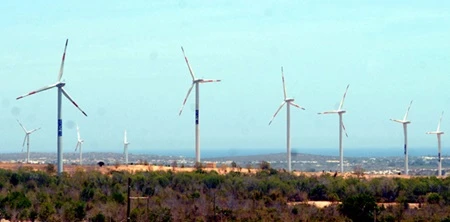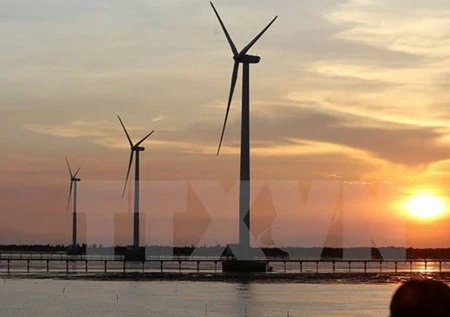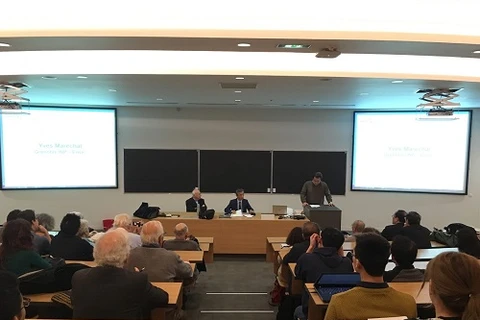 Wind turbines at the Bac Lieu wind power plant in Bac Lieu city in the Mekong Delta region (Source: VNA)
Wind turbines at the Bac Lieu wind power plant in Bac Lieu city in the Mekong Delta region (Source: VNA) HCM City (VNA) - Delegates at a workshop asked for more specific procedures for small wind power projects, longer validity for investment and generation licences, and a stricter Standard Power Purchase Agreement (SPPA) from Vietnam Electricity (EVN).
These were among the petitions related to administrative procedures that were raised at a validation workshop held in HCM City on April 1.
The aim of the workshop was to create more opportunities for further wind power.
The Validation Workshop on "Wind Power Investment Guidelines" was co-hosted by the Deutsche Gesellschaft fur Inter-nationale Zusammenarbeit (GIZ) GmbH in Vietnam and the General Directorate of Energy (GDE) under the Ministry of Industry and Trade (MOIT) in Vietnam.
Aurelien Agut, a GIZ consultant, said that interest to invest in small wind turbines was strong, but there were no clear regulations on the import of small turbines as well as on relevant procedures.
In addition, the time-line of three years for the Decision on Investment is too short and could create risks and unnecessary additional adjustments in administration, leading to more work for authorities as well as the project developer, he said.
"The generation licence has a validity of 10 years," Agut said. "However, the standard lifetime of a wind farm is 20 years. This brings regulatory risk for wind farm developers."
Agut identified several problems in the current Standard Power Purchase Agreement from EVN, including dispatch risk, foreign exchange, and changes in law and tax.
"The EVN SPPA template does not provide the developer with comfort that the offtaker will pay in circumstances of curtailment," Agut said. "And investors expect the SPPA price to be denominated in an international reserve currency or linked to the currency of the developer's debt."
The EVN SPPA requires the tariff to be denominated in dong.
In addition, SPPA should clearly define risk allocation for changes in laws or taxes that would affect the project cash flow.
"Reducing the developer's exposure to this risk is often seen as particularly important in circumstances with public sector offtakers like EVN," he added.
The EVN SPPA should define the acceptable circumstances and process for termination, and allow for assignment under the collateral agreements, he said.
Agut also pointed out that the regulation on decommissioning at the end of the life time of the project was not clearly defined.
The workshop presented the wind power project development phases and a first version of the study on Wind Power Investment Guidelines to the private as well as public sector.
GIZ has been working in close cooperation with the Clean Technology Innovation Private Finance Advisory Network on "Wind Power Investment Guidelines for Project Development and Project Financing".
The guidelines aim to provide more transparency and clarity on the different development phases of a wind project in Vietnam.
They are also expected to bring clarity on the different financing possibilities and schemes for wind power under the current regulatory framework, and provide an opportunity for public authorities at the provincial level to gain understanding of the process.
The Validation Workshop targeted senior officials from relevant ministries, including the Ministry of Industry and Trade and Ministry of Planning and Investment and relevant provincial departments of southern provinces including the Department of Natural Resources and Environment, Department of Planning and Investment, Department of Industry and Trade as well as the private sector.
The workshop is part of the MOIT/GIZ Energy Support Programme under the German Technical Development Cooperation project "Support for the Up-Scaling of Wind Power" (DKTI Wind Project). The aim is to assist the Vietnamese Government to develop and utilise wind energy for socio-economic development.-VNA
























